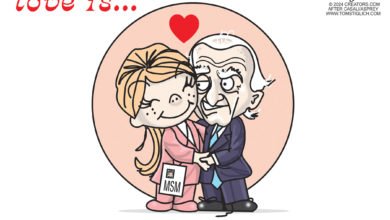NYT Op-Ed Calls For Public Shaming, Doxxing Of Border Protection Agents

- A New York Times op-ed calls for the public shaming of U.S. government employees working in migrant detention facilities
- “These agents’ actions should be publicized, particularly in their home communities,” writes Kate Cronin-Furman
- Cronin-Furman insists that she is not calling for the “doxxing” of government workers, but she describes a scenario where a border protection agent is shamed at church after being filmed at a migrant facility
The New York Times published an op-ed on Saturday that calls for border protection agents to face “serious social costs” and public shaming over their work at facilities housing migrant children.
“The identities of the individual Customs and Border Protection agents who are physically separating children from their families and staffing the detention centers are not undiscoverable,” writes Kate Cronin-Furman, an assistant professor at University College London.
“Immigration lawyers have agent names; journalists reporting at the border have names, photos and even videos. These agents’ actions should be publicized, particularly in their home communities.”
In the article, Cronin-Furman proposes a public shaming campaign — which she insists is not the same as “doxxing” — in hopes of forcing border protection agents to quit their jobs. She also says that her proposal would deter others from taking jobs as border agents.
Tens of thousands of migrants from Central America flock to the border each month in hopes of obtaining asylum to enter the U.S. The influx has tested the limits of border facilities housing migrant children and families.
In the piece, Cronin-Furman envisions a scenario where a U.S. government employee who has been filmed at a migrant facility faces scrutiny at church from fellow congregants.
“The knowledge, for instance, that when you go to church on Sunday, your entire congregation will have seen you on TV ripping a child out of her father’s arms is a serious social cost to bear,” she writes, while insisting that she is not making “an argument for doxxing.”
“It’s about exposure of their participation in atrocities to audiences whose opinion they care about,” Cronin-Furman writes.
“The desire to avoid this kind of social shame may be enough to persuade some agents to quit or may hinder the recruitment of replacements. For those who won’t (or can’t) quit, it may induce them to treat the vulnerable individuals under their control more humanely.”
Cronin-Furman suggests shaming rank-and-file agents — who she calls “foot soldiers” — because they have less “personal investment” than politicians and government officials in border control policies.
“While the leaders who order atrocities may be acting out of strongly held ideological beliefs or political survival concerns, the so-called ‘foot soldiers’ and the middle men and women are often just there for the paycheck,” she writes in the piece.
“Those of us who want to stop what’s happening need to think about all the different individuals playing a role in the systematic mistreatment of migrant children and how we can get them to stop participating. We should focus most on those who have less of a personal commitment to the abuse policies that are being carried out.”
The article also draws comparisons between the border crisis and the Holocaust and genocide in Rwanda.
“In Denmark during World War II, for instance, strong social pressure, including from the churches, contributed to the refusal of the country to comply with Nazi orders to deport its Jewish citizens,” Cronin-Furman writes.
“Thinking of what’s happening in this way gives us a repertoire of tools with which to fight the abuses, beyond the usual exhortations to call our representatives and donate to border charities.”
Democratic lawmakers like Alexandra Ocasio-Cortez have called the border facilities “concentration camps,” evoking images of the Holocaust.
During a presidential debate on Thursday, Colorado Sen. Michael Bennet compared his Polish mother’s experience in World War II to the border crisis.
“When I see these kids at the border, I see my mom because I know she sees herself,” Bennet said. “She was separated from her parents for years during the Holocaust in Poland.”
Bennet’s brother is James Bennet, the Times’ editorial page editor. He did not respond to an email request for comment on the decision to publish the op-ed.
Content created by The Daily Caller News Foundation is available without charge to any eligible news publisher that can provide a large audience. For licensing opportunities of our original content, please contact licensing@dailycallernewsfoundation.org





There ought to be a law.